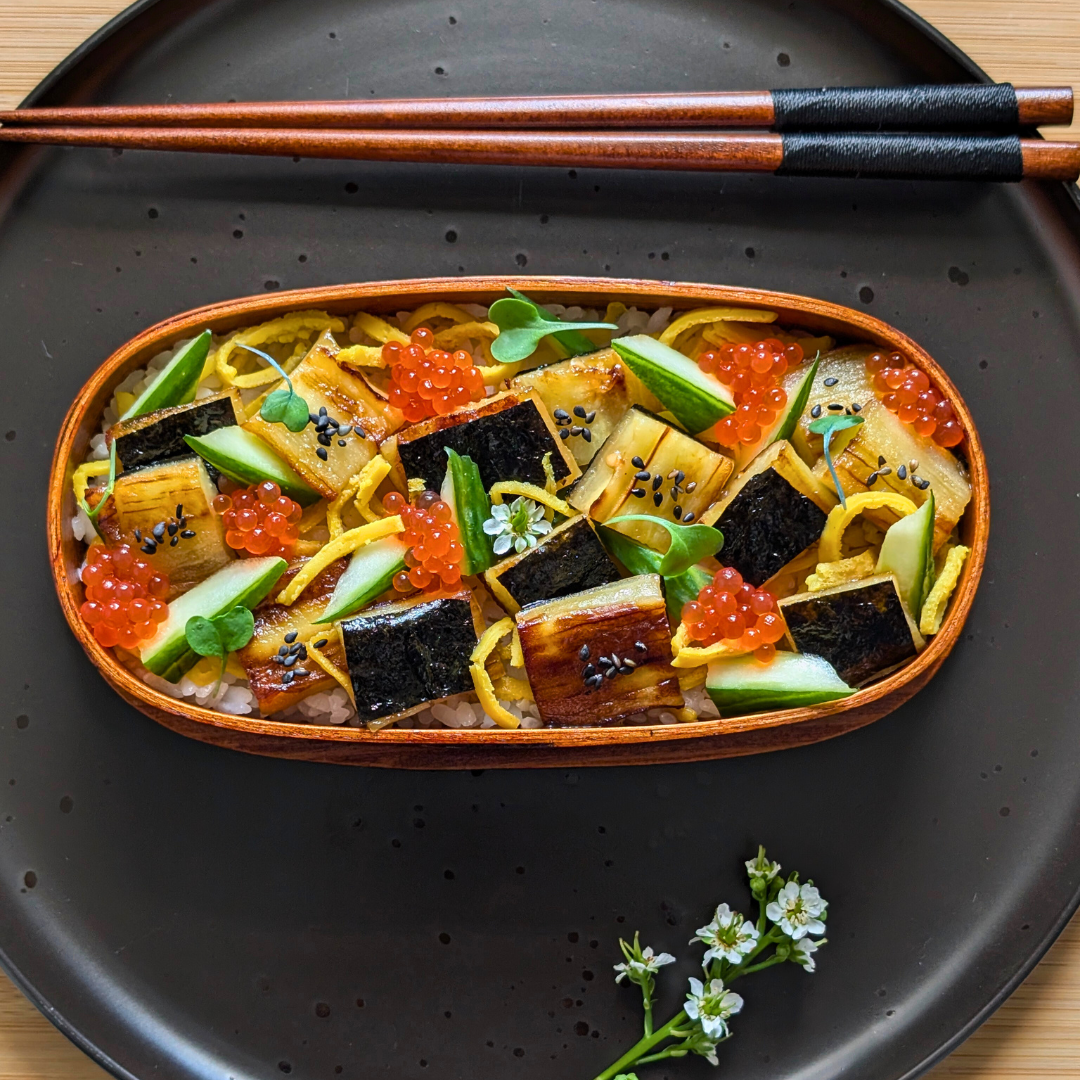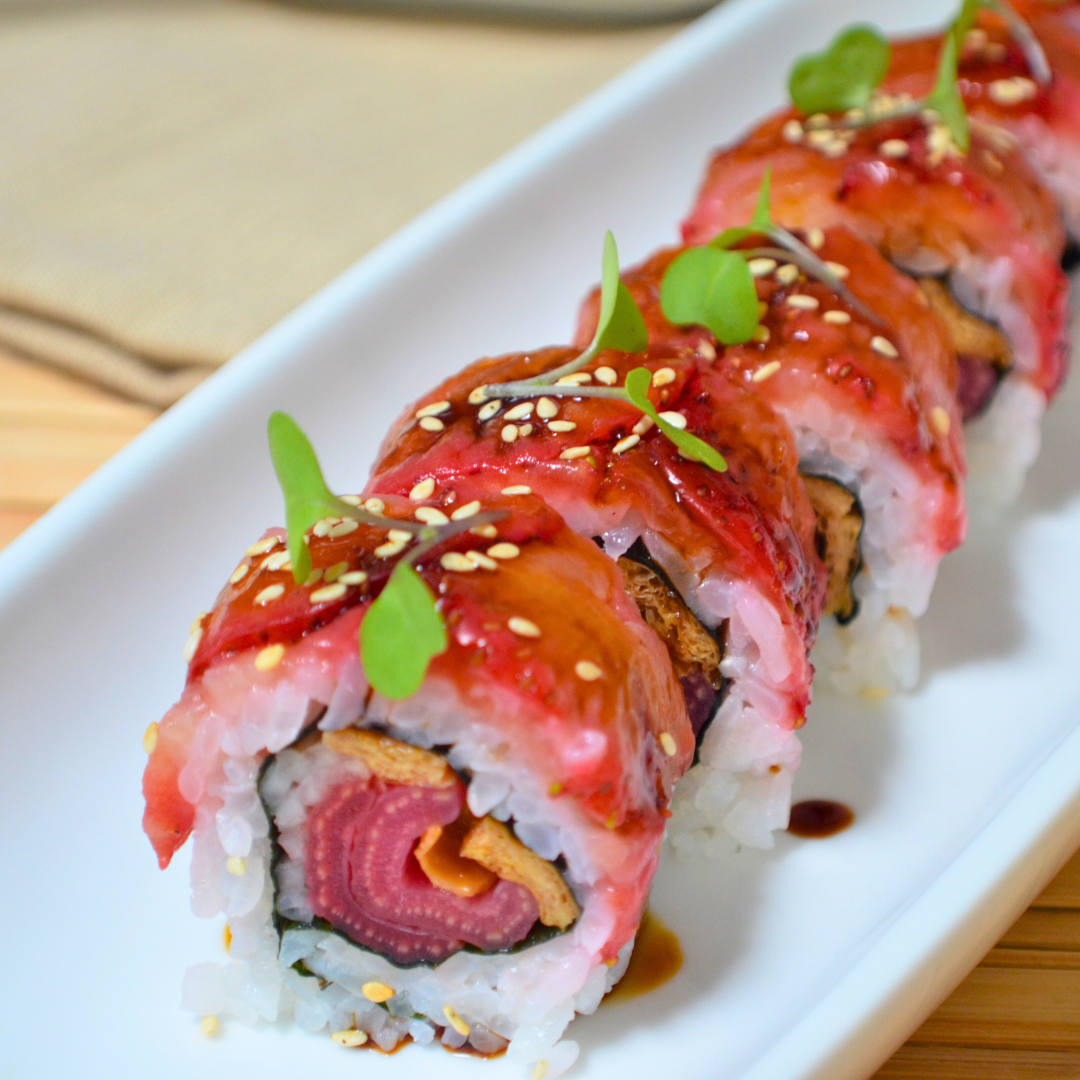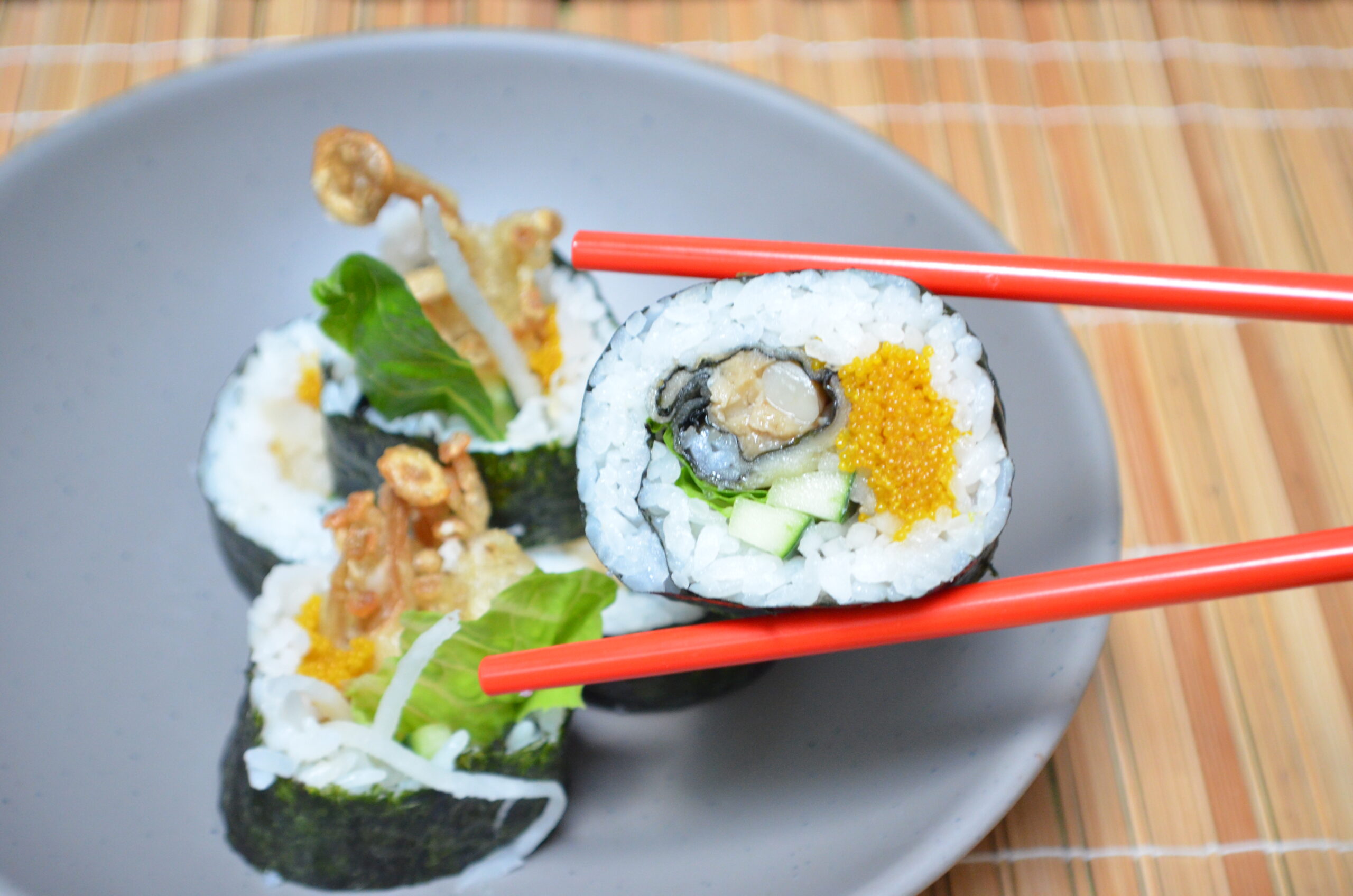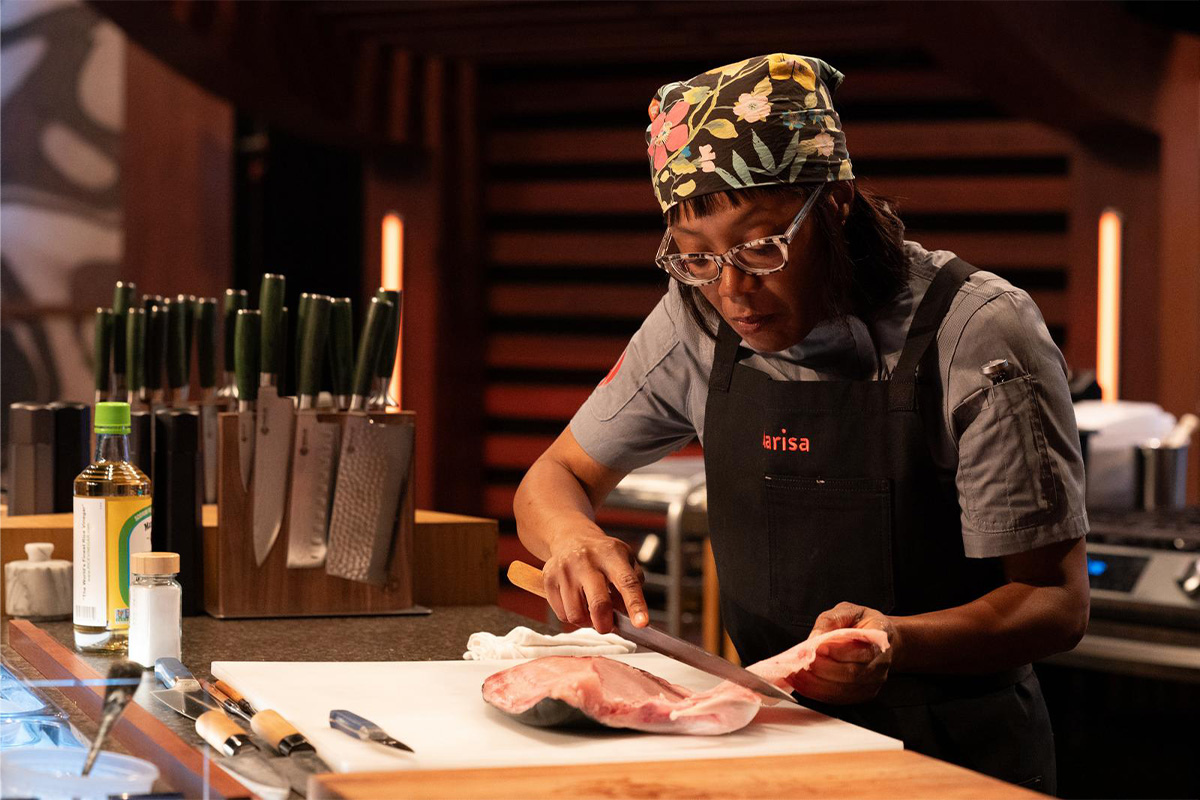Editorial note: Light spoilers ahead for season two of “Morimoto’s Sushi Master.”
Chef Marisa Baggett was in her own personal mitzrayim, or “narrow place,” she tells me. The seasoned sushi chef had recently closed Zayde’s NYC Deli, her Memphis, Tennessee-based kosher catering business, and even more recently announced her retirement from the food industry all together. She had taken down her sushi website, intending to focus on making Jewish art, when an email popped into her inbox.
“Are you the sushi chef Marisa Baggett?” The first line read. “We’ve been looking for you.” The email was from producers of the Roku Channel’s reality cooking competition series “Morimoto’s Sushi Master.” They wanted her to audition. Marisa took it as a sign to continue on in the industry and accepted. She was cast on the show in December 2023 and the show was filmed in early 2024.
Season two of “Sushi Master” just dropped on the Roku Channel last Friday, and it’s clear to see how fateful it was that Baggett is back in the kitchen.
“I call her my silent assassin,” Michelin star-winning chef and judge Phillip Frankland Lee says of Baggett in episode three. “She always has the cleanest station, she’s always quiet and [it] looks like nothing’s going on and then she gives you a great dish.”
He’s not wrong. Chef Marisa might not make a ton of noise in the “Sushi Master” kitchen. But among the seven other contestants on the show’s second season, all of whom are top sushi chefs from across the United States, she stands out. Her technical skills and mastery from nearly two decades in the culinary industry — did I mention that Baggett was the first Black woman in the United States to graduate from professional sushi training? — are on full display. The way she cleanly carves a giant slab of blue fin tuna in episode one and fries a perfect tamagoyaki (a layered Japanese omelette) in episode two are impressive feats on their own. But so, too, is her culinary verve evident. Head judge Iron Chef Masaharu Morimoto likens Baggett’s colorful and balanced sushi platter to “a small garden,” and her bento box is filled with unexpected yet delicious elements like chopped liver and Japanese-inspired custard sweet potato.
She also stands out in another way: Baggett isn’t afraid to serve up her Black Southern Jewish identity to the judges and viewers alike. Immediately upon introducing herself in the first episode, Baggett shares that her sushi is influenced both by the Southern cuisine she grew up with in Mississippi (and is surrounded with in her current home of Tennessee) as well as kosher elements stemming from her Jewish identity. In the first Kesshou challenge of the season (each episode is divided into a non-elimination Ikouze, meaning “let’s go,” challenge and an elimination Kesshou, or “final,” challenge), Baggett prepares a sushi platter featuring chutoro tartare, yellowtail sashimi, shrimp tempura roll, yellowtail and scallion roll, yellowtail nigiri and ikura gunkan. But instead of the traditional wasabi on the yellowtail nigiri, she spices the fish and rice with zhug, a zesty Yemenite hot sauce common in Israeli kitchens.
In the next Kesshou challenge, Baggett uses her bento box as a perfect (and tasty) reflection of herself. First, chef made a custard sweet potato as an ode to her Aunt Joyce, explaining that sweet potato is an important food in the American South and that her aunt was “the sweet potato matriarch of our family.” Then, drawing from her kosher catering past, she created a chopped liver on challah toast that went over huge with the judges.
I won’t spoil the show for you, because you absolutely should watch “Morimoto’s Sushi Master” season two. But, I did get a chance to catch up with Chef Marisa Baggett over email to talk about her culinary journey from a kosher deli to a reality TV sushi-making competition, why it was important to her to bring her Black Southern Jewishness to the Omakase table and Jewish banter with the judges.

This interview has been lightly edited and condensed for clarity.
How did you come to be on “Morimoto’s Sushi Master”?
Very ironically, actually. Not long before, I had officially announced I was retiring from food. I was leaning into what I thought would be my next chapter making Jewish art. I had even taken down my sushi website. One afternoon, I was sitting in a coffee shop working on an art proposal when an email popped into my inbox through my Jewish art website, of all places. The first line read, “Are you also the sushi chef Marisa Baggett? We’ve been looking for you.”
A few interviews and a video test later (where, for reasons I still find hilarious, I demonstrated peeling a Japanese radish using a very classic and hard technique while talking about gefilte fish) I got the call that I was cast. I guess you could say sushi wasn’t quite done with me yet.
I loved the moment in episode three where you’re making the curry shrimp gyoza and you exclaim, “My two nemeses, shrimp and pork, in the same dish!” Was there any more Jewish banter that got cut from the show?
Some of my favorite moments didn’t make the show, especially the Jewish banter with the judges. There was one moment where I served a sushi platter with a Yuzu Shiso Schug instead of traditional wasabi. Probably because of nerves, I pronounced the “ch” sound in schug with the perfect guttural flair. Chef Phillip asked me to repeat it… and before I knew it, I was giving an impromptu pronunciation lesson in the middle of a sushi competition. We went back and forth, with me coaching him on how to nail that throaty “ch.” The entire studio was cracking up.
Another great moment was when I made chopped liver with challah toast for the bento box challenge. The judges and I spent time discussing why chopped liver is different from pâté. Off camera, they kept eating it. It even got to the point where the host, Lyrica [Okano], snatched the plate from the judges and ran off to a corner to polish it off herself.
Those off-screen moments made me feel so seen.
Before being on “Morimoto’s Sushi Master,” you owned Zayde’s NYC Deli in Memphis. You’ve written in your newsletter about being cast on the show and still dealing with the “emotional aftermath” of the deli closing. Can you talk about that?
After closing Zayde’s, I had to face a level of burnout I’d never experienced before — physically, emotionally and spiritually. Once I started to recover physically, I found myself asking a really uncomfortable question: Is food still part of my future?
It was disorienting. Food had been my life’s work for over two decades — it shaped how people knew me, and how I knew myself. But at that moment, I couldn’t see a path forward that didn’t feel overwhelming. So I started exploring other things, like Jewish art. I needed to remember that I could still create beauty and meaning outside of the kitchen. But if I’m honest, I was also grieving. I missed food — but I didn’t know if it would ever feel good again.
The invitation to be on “Sushi Master” surprised me. It felt like a sign saying: You’re not done yet.

Also based on your newsletter, it seems like you approached “Morimoto’s Sushi Master” with a Passover-esque mindset, full of questions about yourself and your future. Would you say that’s accurate?
In a lot of ways, I was very much in my own personal mitzrayim with my health, my emotions and my spirituality. Walking onto that set felt like stepping into a big unknown. I knew I needed to be there. I knew it was time to walk forward. But what I didn’t know was what would it mean to be truly free in the kitchen? What would I do with that freedom? What were my responsibilities? I wasn’t just preparing to cook; I was clearing space and making room for a new kind of relationship with food. And so I walked on set full of questions I didn’t have answers for yet.
Why was it important to you to explicitly bring your Jewishness to the table on the show?
On cooking shows, they always say, “We want to see you on a plate.” But when someone asked me, “What does Marisa look like on a plate?” I mean, where do we begin? I’m a Black Jewish sushi chef from Mississippi. For most of my career, I kept those identities in separate kitchens: one Japanese-influenced, one Jewish-influenced, and the Black Southern part often pushed to the side entirely. I was tired of explaining myself. Tired of splitting myself up.
So for this experience, I decided to just be me. And since my life is so deeply rooted in Judaism, I knew if that part didn’t show up on the plate, it wasn’t a plate I wanted to serve.
You’ve lately moved to making plant-based sushi. What inspired that transition?
I was carrying a lot emotionally when I stepped on set. One question in particular weighed heavily on me, even though I was afraid to ask it out loud: Was keeping kosher still important to me?
I knew avoiding shellfish and pork wasn’t going to be an option, so I made a very intentional choice in the first challenge: I picked shrimp. I figured if I was going to pull the band-aid off, I might as well do it fast. (And honestly… it was good. Sorry, Rabbi!)
And one very intense day filled with oysters, bacon, pork and shrimp, all in one go, forced me to confront what I actually believed. After the cameras stopped rolling, I realized something: Keeping kosher was no longer important to me. But neither was eating meat. What was calling to me was the creativity and discipline of plant-based sushi. It was the beginning of an amazing new chapter.

Kosher sushi is such a big phenomena among the Orthodox Jewish community. Do you have a favorite kosher sushi dish?
I have a special place in my heart for my Mushroom Spider Roll. It’s my take on the sushi bar classic that usually features a whole fried soft-shell crab. I originally created it for a kosher wedding where the groom had grown up eating everything and the bride kept kosher. They wanted sushi that really felt like it came from a sushi bar.
The texture and flavor are so close to the real thing that I had more than one guest pull me aside and ask, “Are you sure this is kosher?”
That has become one of my signature sushi rolls.
What’s next for you?
I’m starting to write a memoir about my path to becoming a sushi chef from Mississippi to sushi school in Los Angeles. It’s part culinary adventure, part identity story and very much a love letter to the wild ride that brought me here.
I’m also finishing a certificate program through Judaism Unbound’s UnYeshiva, which has deepened the way I think about Jewish identity and storytelling. After I complete the program, I want to help others reflect on what their own Jewish stories might look like on a plate because we all carry flavors, memories and meanings that are worth naming and sharing.
And for the first time in a long time, I’m not trying to pick just one path. I’m saying yes to the full story.



